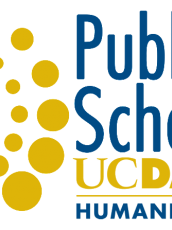Call for Proposals: 2016 Mellon Public Scholars Fellowships
UC Davis Humanities Institute
Deadline: Monday, January 4, 2016, by 5 p.m.
The UC Davis Humanities Institute invites applications for the
first cohort of
Mellon Public Scholars. This program is aimed at introducing
graduate students to the intellectual and practical aspects of
identifying, addressing, and collaborating with members of a
public through their scholarship. Ten successful graduate student
applicants will participate in a quarter-long, two credit seminar
in spring 2016. Each student will be matched with a faculty
mentor to develop a community-based research project, and will
receive a $7,500 stipend to support the project that summer. Also
intended to support faculty and their community-engaged research,
the Mellon Public Scholars Program will award each faculty mentor
$2,000 in research funds for providing guidance and consultation
to students developing community-based projects.
There is no expectation that fellows will have a fully developed
project or a community partner and faculty mentor at the time of
application. Rather, the program will assist students in such an
endeavor, helping them to broaden their scholarship both beyond
the university and within it, developing relationships with
faculty outside of their discipline.
To answer questions and provide more details about the program,
the Humanities Institute will host two information sessions:
Wednesday, Nov. 4, 12:10 p. m. and Thursday, Nov. 12,
4:10 p. m. in Voorhies 228 (DHI’s conference room). We
encourage both faculty and students interested in the program to
attend. Lunch and snacks provided. Please RSVP to Rachel Reeves
(rlreeves@ucdavis.edu).
Eligibility
We welcome doctoral students in the humanities and humanistic
social sciences at any stage in their graduate training. Although
priority may be given to those who are post-candidacy, anyone
with an interest in public humanities is encouraged to apply,
whether or not that interest is obvious in their dissertation
research.
Application Guidelines
1.CV: No longer than 2 pages, includes academic
accomplishments, contact information, academic department,
advisor’s name, and projected date of graduation.
2.Letter of intent: No longer than 2 pages,
addresses the following: How do you see this experience enriching
or expanding your graduate training? How do your background and
experiences relate to your interest in public scholarship?
Describe a project (at any stage of development) that engages the
public, draws on your scholarly or creative skillsets, and has an
end product. If you have spoken to a faculty member about your
project, feel free to list them by name. You might draw
inspiration from the sample projects below.
Submission
To submit your proposal online, please go to http://dhi.ucdavis.edu/funding/
and complete the online application form. Proposals due by 5 p.m.
on January 4, 2016. Late submissions will not be considered. We
hope to announce the fellows by early February, allowing fellows
to meet one another and participate in the March 7th launch event
for the Mellon Public Scholar Program. Please contact Program
Manager Rachel Reeves (rlreeves@ucdavis.edu) with any
questions.
SAMPLE PROJECTS:
Community Partner: Yolo County Food Bank
Project Title: Hidden Hunger
Description: The Mellon Public Scholar will design and implement
a data collection method to assess the gaps in Yolo County’s
emergency food system. The goal of this project is to identify
populations and areas within the county not receiving/accessing
food assistance resources. Additionally, this project will
identify barriers that prevent food-insecure residents from
accessing services (e.g., scheduling conflicts, transportation,
stigma, lack of awareness).
Project Title II: Food Translator
Description: The Yolo Food Bank has seen a greater variety of
fruits and vegetables over the last few years make its way
through the Food Bank. Not surprisingly, many clients are
reluctant to accept food they have never seen before and don’t
know how to prepare. This project is ripe for a Mellon Public
Scholar who could help Yolo Food Bank overcome this barrier by
identifying and implementing strategies to encourage clients to
accept and prepare something that may be new to them.
Community Partner: California Energy
Commission,
Project Title: Social and Institutional Barriers to Energy
Efficiency
Description: This project seeks creative, human-centered
solutions to climate change, long the exclusive province of
engineers and biochemical scientists. The Public Scholar could
approach barriers to adaptation in a number of ways, including
but not limited to: engaging citizen science to promote climate
mitigation in the energy sector; comparing acceptance of climate
scenarios across California and the nation; developing innovative
ways to build resilience to climate change impacts in the most
vulnerable communities.
Community Partner: Stewards of the Coast and Redwoods
Project Title: Pond Farm Pottery Oral History Project
Description: Founded in Guerneville, California, in the 1930s,
Pond Farm was an artist colony whose faculty was composed
primarily of artisans fleeing Nazi Germany, including Marguerite
Wildenhain, a graduate of the Bauhaus who became master potter at
the site. In 2014, Pond Farm was added to the National Registry
of Historic Places and is in need of renovation and
rehabilitation. The Mellon Public Scholar will contribute to this
restoration project by designing and implementing an oral history
project to document Pond Farm’s rich artistic and social
legacy.
Community Partner: Baltimore and UC Davis
Communities
Project Title: The Freddie Gray Project
Description: This project combines anthropological research
methods and playwriting techniques to promote deep conversations
about race. The Mellon Public Scholar will collect interviews
with the friends and neighbours of Freddie Gray, the Baltimore
police, and political, religious, and community leaders. The text
of these interviews will be presented to the UC Davis and
Baltimore communities as a theater piece and serve as the basis
for a dialogue about contextualization, representation, and
race.
For more examples of similar community-based projects, see:
http://humanities.wisc.edu/public-humanities/exchange-program/past-projects









